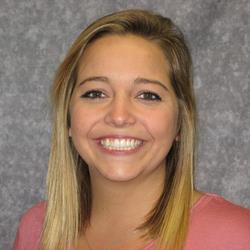Guthrie County Hospital utilizes a Speech-Language Pathologist to treat people of all ages, including children, adults and elderly individuals. A speech therapist evaluates and treats individuals with speech, language, and swallowing disorders.
Common candidates for speech therapy:
Children with:
• Developmental delays
• Language disorders
• Learning disabilities
• Speech and hearing impairments
• Cleft palate
• Autism Spectrum Disorders
• Voice disorders
Adults who have or have had:
• Stroke
• Head injury
• Degenerative disease
• Dementia or cognitive impairments
• Cancer of head, neck and throat
• Voice disorders
• Difficulty swallowing
Language disorders
A SLP aids in the rehabilitation of language skills when an individual has difficulty understanding and expressing language. Language disorders can affect the form, use, and content of language that allow individuals to communicate in effective and socially appropriate ways.
Language disorders include:
- Aphasia
- Language-based learning disabilities
- Expressive and receptive language delays and disorders
- Selective Mutism
Speech disorders
Speech disorders occur when an individual has difficulty with production of accurate speech sounds, fluency, or voice and/or resonance. Therapy for speech disorders enhances the use of functional communication and improves quality and intelligibility of speech.
Speech disorders include:
- Apraxia of speech
- Dysarthria
- Speech sound disorders
- Voice disorders
- Stuttering
Cognitive-communication disorders
Cognitive-communication disorders include difficulty with organizing thoughts, sustaining attention,memory, planning, and/or problem-solving. The SLP works to rehabilitate these skills and introduces and guides practice of compensatory strategies for success.
Common causes of cognitive-communication disorders include:
- Stroke
- Traumatic brain injury
- Degenerative diseases (Multiple Sclerosis, Parkinson’s disease, Amyotrophic Lateral Sclerosis etc.)
- Dementia
Social communication disorders
Individuals with social communication disorders have trouble with the use of social communication such as greetings and commenting, following the rules of conversation, and adjusting communication styles for different listeners and situations. Speech therapy enhances and promotes the use of appropriate social skills.
People with social communication disorders may have or have had:
- Autism
- Stroke
- Traumatic brain injury
Swallowing disorders
The act of swallowing involves three stages: oral phase, pharyngeal phase, and esophageal phase. Swallowing disorders can occur at any stage. SLPs work with individuals who experience problems during the oral and pharyngeal stage(s). Difficulty swallowing can result in entrance of material into the lungs, which can increase the potential for pneumonia. Rehabilitation of the swallow aims to lower this risk and to create a more efficient swallow.
Common causes of swallowing disorders:
- Stroke
- Traumatic brain injury
- Degenerative diseases
- Spinal cord injury
- Cerebral palsy
Augmentative and Alternative Communication (AAC)
AAC is the use of communication in a form other than oral speech. Those that experience severe speech or language difficulties may benefit from the use of AAC to aid in communication. The use for AAC ranges from low-tech to high-tech options that best fit the individual’s wants and needs. The use of AAC does not discourage the use of speech and language development; rather it enhances the use of functional and meaningful communication.
Examples of AAC:
- Picture, symbol, and alphabet communication boards
- Electronic devices dedicated to communication
- Speech output apps

McKenzie Jensen, MA CCC-SLP
McKenzie is a certified Speech Language Pathologist who graduated with her Bachelor’s and Master’s Degree from the University of Northern Iowa. She provides treatments in the hospital, in private homes, as outpatients, and at nursing homes. McKenzie enjoys working with individuals of all ages.
For further information call 641-332-3810
